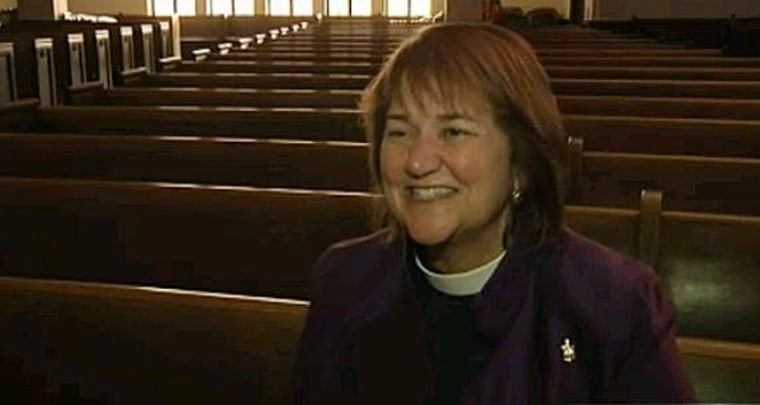Thirteen years after the historic consecration of Gene Robinson as the first openly gay bishop in the Episcopal Church, Karen Oliveto has become the first openly LGBTQ bishop in the United Methodist Church (UMC).
In some ways, Oliveto is playing a role in advancing same-sex equality within mainstream religious denominations.
Mary Beth Maxwell, Senior Vice President of Programs, Research and Trainings for the Human Rights Campaign, considers Oliveto’s elevation a barrier-breaking, door-opening opportunity.
“It’s a powerful symbol and message of belonging and inclusion,” Maxwell told NBCOUT. “LGBTQ people sitting in the pews at their United Methodist churches will know that they are not only respected and affirmed in who they are, but also welcomed into the highest positions within the church.”
However, Oliveto’s election comes at a time when the denomination is in the midst of a theological, ethical and political struggle. Anne Burkholder, Associate Dean of Methodist Studies at Candler School of Theology in Atlanta provides some insight.
“Bishop Oliveto’s election is having a mixed impact on the denomination,” she told NBCOUT via email. “Just as with my students, her election gives many United Methodists hope and mortifies others.”
According to the 2012 Book of Discipline, the UMC’s governing book, “The practice of homosexuality is incompatible with Christian teaching. Therefore, self-avowed practicing homosexuals are not to be certified as candidates, ordained as ministers, or appointed to serve in The United Methodist Church.”
And while a different UMC jurisdiction has challenged Oliveto’s election, Burkholder points out that her election took place in full accordance with the Discipline.
“Her election is a sign that the movement toward a more progressive, inclusive denomination is not going to wait for slower, evolutionary institutional changes,” she said. “In my particular work with students, I focus on insuring that students figure out how to be engaged in the denomination with integrity, whether they are straight, LGBTQA, allies, traditional-orthodox, from the west, east, north, south, or beyond the U.S. I assist many students with figuring out where they will best fit and connect them to those particular conferences.”
The UMC is separated into five jurisdictions where bishops are nominated by their conference. Candidates must be in “good standing” and are usually lead clergy members of the conference delegation, Burkholder explained. Oliveto was a member in good standing of the California-Nevada Conference and nominated by her annual conference. During the session of the Western Jurisdictional Conference in Scottsdale, Arizona, after she was the only candidate to remain on the ballot in July. Oliveto was one of 15 bishops elected this year, with 10 of those elected being either a person of color, female and/or lesbian.
The struggle the UMC is having is not anything new. It reflects, as Burkholder puts it, the tension alive and well in society overall. How do we honor our differences while at the same time upholding our traditions?
“The struggle for acceptance as clergy and the right to celebrate same-sex marriages is not a national conversation for us; it is international,” Burkholder noted. “As the U.S. has evolved toward greater inclusion of LGBTQA persons into our society, culminating most recently in the national legalization of same-sex marriage, the UMC has become more international, with a larger and larger and more conservative membership from outside the U.S.”
In other words, if the decision were up to only UMC delegates within the United States, then statistics show the church would have already moved toward a more inclusive stance.
Burkholder is not suggesting the United States is more advanced on the issue, but that there are contextual factors influencing the issue in other corners of the world. Yet, the reality that some of her students are faced with having to choose their call over their identity angers her.
“It means they are put in the position of having four choices: 1) to remain in the closet; 2) to choose to stay and work for justice, 3) to leave the UMC and go to a different denomination or church, or 4) eventually move to a congregation or part of the country that is more open and affirming of LGBT persons.”
Maxwell is hopeful. Having LGBTQ people at the table, including in leadership positions, makes clear that all are welcome and ensures that every perspective is heard, she said.
“We know that people do their best when they can bring their whole selves to work,” Maxwell said. “As people, we are all informed and shaped by our own lived experiences and for LGBTQ people, that includes our sexual orientation and gender identity. Our diversity, including in faith communities, makes us stronger and better.”

